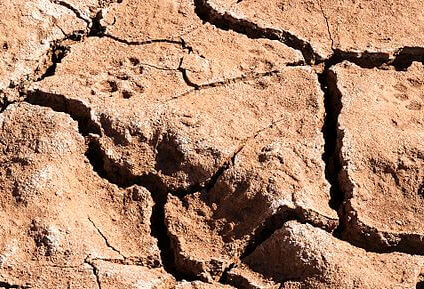
The world is at risk of experiencing significant disruptions in food supplies even before temperatures reach the 1.5°C target set by climate agreements, warns Alain-Richard Donwahi, the president of the UN’s desertification conference.
He stressed that the consequences of the climate crisis, coupled with water scarcity and unsustainable farming practices, pose a severe threat to global agriculture.
“Climate change is a pandemic that we need to fight quickly. See how fast the degradation of the climate is going – I think it’s going even faster than we predicted,” he said. “Everyone is fixated on 1.5C [above pre-industrial levels], and it’s a very important target. But actually, some very bad things could happen, in terms of soil degradation, water scarcity and desertification, way before 1.5C.”
Donwahi, a former Ivory Coast defence minister who led last year’s UN Cop15 summit on desertification, highlights that the impacts of drought are unfolding at a faster pace than anticipated. Rising temperatures, heatwaves, intensified droughts, and floods are all undermining food security in various regions.
“[Look at] the effects of droughts on food security, the effects of droughts on migration of population, the effect of droughts on inflation. We could have an acceleration of negative effects, other than temperature,” he said.
Additionally, he emphasises that poor farming methods exacerbate the challenges faced in agriculture. “The degradation of soil comes with bad habits, and the way we do our agriculture will lead to degradation of the soil. When the soil is affected, the yield is affected,” he said.
To address these issues, Donwahi urges private sector investors to engage and seize opportunities for profitable solutions. “The private sector has an interest in agriculture, and the better usage of the soil. We’re talking about [improving] yields. We’re talking about agroforestry, which is another way the private sector can have a return on investment,” he said. “We have to be innovative, to find new vehicles for finance.”
In 1992, governments worldwide signed a treaty committing to combat desertification, alongside the UN framework convention on climate change and the UN convention on biodiversity. Despite this commitment, the desertification treaty receives less attention compared to its climate and biodiversity counterparts. Last year’s Cop15 on desertification garnered less attention than Cop27 on climate and Cop15 on biodiversity. Desertification conferences are held less frequently, with the next one scheduled for Riyadh in December 2024, while Cop28 on climate will convene in late November in Dubai.
Donwahi underscores the critical importance of not overlooking the issue of desertification, emphasising that the world cannot afford to do so.
“We need to solve all the problems together. Desertification and drought leads to climate change, leads to loss of biodiversity. And when you have climate change you have droughts, floods, storms.
“It’s not only the poor countries, everybody is in the same boat [on food security]. Climate change, droughts, storms, floods don’t know any boundaries, they don’t need a visa to go into a country.”
Furthermore, he suggests that wealthy countries should turn to Africa for solutions to the climate crisis. Africa possesses a wealth of natural resources, including minerals essential for renewable energy technology, extensive forests, abundant sunlight, and vast groundwater reserves. These resources could play a pivotal role in reducing greenhouse gas emissions, enhancing food security, and preserving biodiversity. Donwahi encourages Africans to seize these opportunities for the greater good.
“Africa is a continent of solutions. It’s a continent where you have the most natural resources. The people who have the finance should help the people who have the natural resources. It’s a win-win situation, a partnership situation,” he said.
He called on Africans to seize these opportunities. “If the Africans realise that Africa is a solution, they will act differently – they will come with a more positive attitude, that you’re fighting to find solutions together. That’s how we should think – you don’t want to always be the one waiting for the help, for the handout, waiting cap in hand.”
——————————————————————————
At Natural World Fund, we are passionate about stopping the decline in our wildlife.
The decline in our wildlife is shocking and frightening. Without much more support, many of the animals we know and love will continue in their decline towards extinction.
When you help to restore a patch of degraded land through rewilding to forests, meadows, or wetlands, you have a massive impact on the biodiversity at a local level. You give animals a home and food that they otherwise would not have had, and it has a positive snowball effect on the food chain.
We are convinced that this is much better for the UK than growing lots of fast-growing coniferous trees, solely to remove carbon, that don’t actually help our animals to thrive.
This is why we stand for restoring nature in the UK through responsible rewilding. For us, it is the right thing to do. Let’s do what’s right for nature!
Donate today at https://naturalworldfund.com/ and join in the solution!

